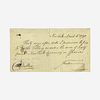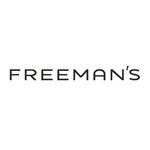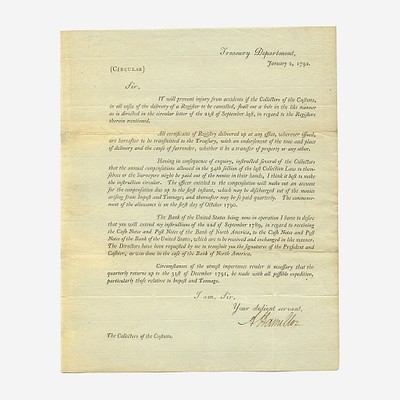[Hamilton, Alexander] Steuben, Baron von, and Alexander Hamilton Promissory Note, signed and endorsed
About Seller
2400 Market St
Philadelphia, PA 19147
United States
Established in 1805, Freeman’s Auction House holds tradition close, with a progressive mind-set towards marketing and promotion, along with access to a team of top experts in the auction business. And now with offices in New England, the Southeast, and on the West Coast, it has never been easier to ...Read more
Two ways to bid:
- Leave a max absentee bid and the platform will bid on your behalf up to your maximum bid during the live auction.
- Bid live during the auction and your bids will be submitted real-time to the auctioneer.
Bid Increments
| Price | Bid Increment |
|---|---|
| $0 | $25 |
| $500 | $50 |
| $1,000 | $100 |
| $2,000 | $200 |
| $3,000 | $250 |
| $5,000 | $500 |
| $10,000 | $1,000 |
| $20,000 | $2,000 |
| $30,000 | $2,500 |
| $50,000 | $5,000 |
| $100,000 | $10,000 |
About Auction
Oct 25, 2021
Freeman's is honored to present The Alexander Hamilton Collection of John E. Herzog, a single-owner sale of Alexander Hamilton material, on October 25. Curated by Darren Winston, Head of the Books and Manuscripts Department. Freeman's info@freemansauction.com
- Lot Description
[Hamilton, Alexander] Steuben, Baron von, and Alexander Hamilton Promissory Note, signed and endorsed
New York, April 6, 1790. One sheet, 4 x 7 1/4 in. (102 x 184 mm). Manuscript promissory note in a secretarial hand, signed by Prussian and American military officer Baron von Steuben, to New York physician James Tillary, for "Sixty pounds New York currency in specie"; endorsed by Alexander Hamilton, Tillary, William Maxwell, and Bank of New York cashier, Charles Wilkes, on verso, docketing by Tillary to same. Creasing from original folds; some ink smudging, left side; old mounting tape along top edge verso. Lot includes ephemera relating to Steuben and Hamilton.
Baron von Steuben suffered financial hardships following the American Revolution, with Congress failing to pay him a pension, and often honoring only some of his expenses. Hamilton and friend Benjamin Walker often aided Steuben in his times of need, and it wasn't until 1790, the year this note was issued, that Steuben received a fraction of the pension owed him. The little Congress gave Steuben allowed Hamilton to help stabilize his finances, and for the remainder of his life he split his time between New York City and land granted him for his war service in Utica, New York. He died in 1794.
James Tillary was a New York physician and Federalist politician, and close friends with both Steuben and Hamilton. Steuben at one point rented an apartment from Tillary at the southeast corner of Broadway and Wall Street, and Hamilton often lent money to Tillary.
- Shipping Info
-
No lot may be removed from Freeman’s premises until the buyer has paid in full the purchase price therefor including Buyer’s Premium or has satisfied such terms that Freeman’s, in its sole discretion, shall require. Subject to the foregoing, all Property shall be paid for and removed by the buyer at his/ her expense within ten (10) days of sale and, if not so removed, may be sold by Freeman’s, or sent by Freeman’s to a third-party storage facility, at the sole risk and charge of the buyer(s), and Freeman’s may prohibit the buyer from participating, directly or indirectly, as a bidder or buyer in any future sale or sales. In addition to other remedies available to Freeman’s by law, Freeman’s reserves the right to impose a late charge of 1.5% per month of the total purchase price on any balance remaining ten (10) days after the day of sale. If Property is not removed by the buyer within ten (10) days, a handling charge of 2% of the total purchase price per month from the tenth day after the sale until removal by the buyer shall be payable to Freeman’s by the buyer. Freeman’s will not be responsible for any loss, damage, theft, or otherwise responsible for any goods left in Freeman’s possession after ten (10) days. If the foregoing conditions or any applicable provisions of law are not complied with, in addition to other remedies available to Freeman’s and the Consignor (including without limitation the right to hold the buyer(s) liable for the bid price) Freeman’s, at its option, may either cancel the sale, retaining as liquidated damages all payments made by the buyer(s), or resell the property. In such event, the buyer(s) shall remain liable for any deficiency in the original purchase price and will also be responsible for all costs, including warehousing, the expense of the ultimate sale, and Freeman’s commission at its regular rates together with all related and incidental charges, including legal fees. Payment is a precondition to removal. Payment shall be by cash, certified check or similar bank draft, or any other method approved by Freeman’s. Checks will not be deemed to constitute payment until cleared. Any exceptions must be made upon Freeman’s written approval of credit prior to sale. In addition, a defaulting buyer will be deemed to have granted and assigned to Freeman’s, a continuing security interest of first priority in any property or money of, or owing to such buyer in Freeman’ possession, and Freeman’s may retain and apply such property or money as collateral security for the obligations due to Freeman’s. Freeman’s shall have all of the rights accorded a secured party under the Pennsylvania Uniform Commercial Code.
-
- Buyer's Premium



 EUR
EUR CAD
CAD AUD
AUD GBP
GBP MXN
MXN HKD
HKD CNY
CNY MYR
MYR SEK
SEK SGD
SGD CHF
CHF THB
THB![[Hamilton, Alexander] Steuben, Baron von, and Alexander Hamilton Promissory Note, signed and endorsed](https://s1.img.bidsquare.com/item/l/9470/9470932.jpeg?t=1MwoEQ)
![[Hamilton, Alexander] Steuben, Baron von, and Alexander Hamilton Promissory Note, signed and endorsed](https://s1.img.bidsquare.com/item/s/9470/9470932.jpeg?t=1MwoEQ)











